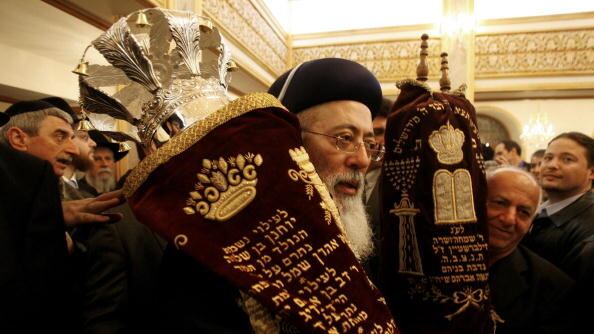The fundamental problem between Israel and American Jews isn’t the settlements, isn’t the peace process, isn’t Bibi and Obama, or any political issue—it’s religion. Israel’s religious leaders, who have large constituencies at home and abroad, oppose Reform Judaism because it undermines Jewish identity and so weakens the Jewish people. Sephardic Chief Rabbi Shlomo Amar recently reminded everybody of this, prompting outrage from Reform Jews, such as Uri Regev writing on Open Zion.
Reform Judaism in the U.S. claims to be committed to Jewish survival, but promotes the exact opposite. Reform rabbis conduct marriages between Jews and non-Jews, sometimes with non-Jewish clergy present. Most other branches of Judaism reject intermarriage as invalid because Jews can only marry other Jews. Around half of Reform rabbis now officiate at intermarriages—in theoretical defiance of their own movement’s rules. The most prominent example was when James Ponet, a Reform rabbi at Yale University, and Rev. William S. Shillady, a Methodist minister, jointly performed the wedding of Chelsea Clinton and Marc Mezvinsky in 2010.

For their part, many Reform Jews believe that they have addressed the intermarriage problem. Back in 1983, Reform Judaism recognized the Jewish identity of children of “patrilineal descent.” This supposedly means children with Jewish fathers and non-Jewish mothers are treated as fully Jewish (by contrast, traditional Judaism believes that Jewish identity passes through the mother). The decision to accept “patrilineal” children has apparently integrated thousands of young people who would otherwise have been considered not Jewish. Sympathetic demographers, such as Prof. Leonard Saxe at Brandeis University, claim that recognizing “patrilineal descent” turned intermarriage from an act of Jews “rejecting their religion” to one that “is not necessarily a rejection of Jewish identity.”
Unfortunately, this effort at Jewish integration has failed, in large part because Reform rabbis ignored their own guidelines. The actual Reform decision was conditional. It gave a “presumption” of Jewish descent that was “to be established through appropriate and timely public and formal acts of identification with the Jewish faith and people.” These conditions were often not applied. The result is that “patrilineal” children don’t feel Jewish. As Clifford Librach, a Reform rabbi in Connecticut, has said, “Most kids of mixed marriages are not embracing Jewish identity.” Rabbi Arthur Hertzberg z’l, a visionary among Jewish leaders, foresaw this problem and offered that Conservative Jews would accept “patrilineal” children if they were ready for formal conversion to Judaism by age of religious adulthood (13 for boys, 12 for girls). Sadly, his proposal was spurned and the “patrilineal” experiment failed.
Recognition of “patrilineal” Jews, like acceptance of intermarriage, sounds nice, warm, and inclusive—except that this simply relabels the problem. Only one-third of the children of intermarriages are raised wholly or partially as Jews. Worse, the children of intermarried Jews have a 76% intermarriage rate. Intermarriage excludes tens of thousands of children from the Jewish people every year. As the leading sociologist of intermarriage Steven M. Cohen, a research professor at Reform Judaism’s main educational institution, has written, “Intermarriage does indeed constitute the greatest single threat to Jewish continuity today, both on an individual level and on a group level.”
This is bad for American Jews and bad for Israel. The Jewish state needs a vibrant and viable Diaspora—as a partner and source of immigration. That relationship is endangered when the largest Jewish denomination in the U.S. enables assimilation.
Yet instead of answering Rabbi Amar, Uri Regev criticizes him for alleged “hate speech.” Regev also seeks to undermine Rabbi Amar’s legitimacy, claiming, “There is no parallel to the institution of the Chief Rabbinate in any Diaspora community, and it has no precedent in history.” To cap it all, Regev argues that Rabbi Amar and the state of Israel are “on a collision course with world Jewry.”
While Regev denounces Rabbi Amar for “hate speech,” he commits the same offence himself by calling the Chief Rabbi “a threat to the State of Israel and the Jewish people.” Similarly, Regev ignores Jewish history when he portrays the Chief Rabbinate as an invention with unprecedented powers. Consider Greece: Before the Holocaust, the Greek Jewish community was the largest of the Judeo-Spanish communities that had controlled the Sephardic Chief Rabbinate from its inception in the seventeenth century up until the 1950’s. The rabbinate in Greece has more control, in some ways, than the Israeli rabbinate. According to Law 2456/1920, there can only be one Jewish community in a Greek town. This makes Orthodoxy the state-backed, exclusive norm in all aspects of Jewish life, including marriage and personal status. The only way out until recently was to intermarry, marry abroad, or convert to another religion—which is not easy, given that proselytism is illegal.
Worst of all, Regev conflates American Jews with “world Jewry.” Regev does this to threaten Israel with the loss of global Jewish support. In the process, he ignores the fact that American Jews are a minority, just 39% of the global Jewish population, in part because of intermarriage.
Reform Judaism has made important contributions to Jewish life. It helped force Orthodoxy to define itself, encouraged Jews to grapple with modernity, and—through rabbis such as Albert Friedlander z’l and Hugo Gryn z’l—expressed clear moral messages. Sadly, today, Reform Judaism in America is acting against Jewish continuity.





